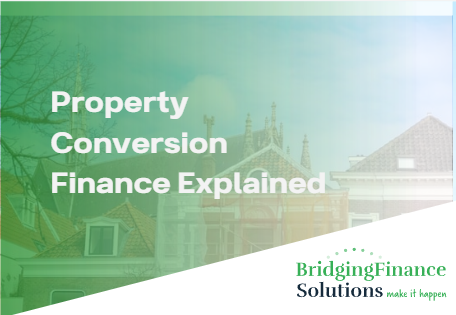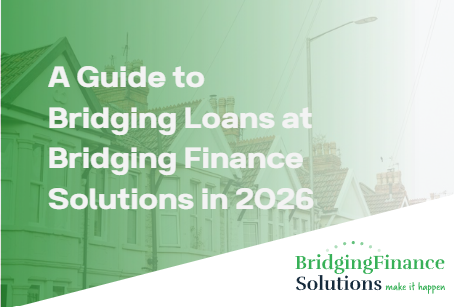If you are a business owner or developer looking to develop a property, you will know more than most just how costly the process can be. You have to consider the price of materials, labour and time spent on the project.
If you do not have the funds for your project readily available, you will likely need to take out property development finance to fund the development.
At Bridging Finance Solutions, we have helped make countless projects happen by providing the necessary development finance to developers. This guide will outline exactly what property development finance is and what you need to know before applying for it.
What is Property Development Finance?
Property development finance refers to the funding acquired to support the costs associated with property development projects. This can include loans or other financial arrangements to purchase land, upgrade existing properties, or build new developments. It provides the necessary capital to turn a development idea into reality.
There are several types of property development finance available, and the kind you might need depends entirely on the kind of project you are completing.
Types of Property Development Finance
If you are looking to finance a development but are unsure exactly what type of finance you should apply for, you’re in the right place.
Bridging Loans
A bridging loan is a short-term financing option often used in property development to ‘bridge the gap’ between different project phases. It is helpful when buying property before selling existing assets, or when swift access to funds is necessary to take advantage of development opportunities.

Building Development Loan
Building development finance is a specialised funding type aimed at supporting property projects. It supplies the essential capital for constructing new buildings, converting existing ones, or refurbishing current structures. This short-term, asset-secured financing is customised to developers’ needs, helping them manage cash flow and project expenses efficiently. As a private lender, at BFS, we can provide a more flexible and quicker alternative to traditional banks, simplifying access to funds and facilitating successful project completion.
Refurbishment Loans
Refurbishment bridging loans, also known as property refurbishment finance, are short-term loans used to fund renovations, refurbishments, or improvements. They are secured by the property undergoing refurbishment, although additional properties can also be used as collateral.
These loans serve as a great alternative to traditional business financing, which can often be denied if the property does not meet standards or if the borrower has limited property development experience.
Self-Build Finance
A self-build development loan is intended for people constructing a new home or making substantial renovations. Unlike conventional loans that release a single lump sum, self-build financing releases funds gradually, in stages that match the construction progress.
How Does Property Development Finance Work?
Property development finance does not work the same as a traditional mortgage; instead, it is designed to follow the progress of construction projects, making it much more flexible than typical finance.
Often funding is based on the property’s Gross Development Value (GDV), which is essentially the expected value once the project is complete, and you can choose to receive the finance as a lump sum or to have the money released in stages.
Interest on development finance loans can be rolled up, with the bill for the loan being due at the end of the loan or serviced monthly, meaning that you repay any interest in monthly repayments.
This type of loan is usually secured against the property in question, and if you default on your repayments, you put the property at risk.
As lenders, we always want to know exactly how and when a property will be repaid. That is why it is also important to ensure that we have an exit strategy before releasing funds to a developer. Make sure that you can provide your lender with that information before you agree to a loan.
Who Can Benefit from Development Finance?
If you are looking for finance for your project but are unsure of which financial solution is most suitable for your needs, here are just a few examples of who can benefit from development finance.
Experienced Developers
It is quite common for seasoned developers to manage several projects simultaneously. Securing development finance allows these developers to access the necessary funds or equity to support multiple endeavours.
This financial backing helps ensure they have sufficient resources available to cover any unexpected expenses or shortfalls that may arise during their projects, providing a safety net and maintaining project continuity.
First-time Developers
Many high-street lenders hesitate to support newcomers due to perceived risks. However, lenders like Bridging Finance Solutions enable first-time developers to secure funding for smaller projects, such as constructing a single home on a plot of land, converting a house into flats or an HMO, or refurbishing a property for sale or rent.

Businesses Looking to Expand Property Portfolios
For companies looking to expand their property portfolios, development finance offers the flexibility to undertake larger or more frequent projects without heavily tying up capital. Whether it’s acquiring land for new developments, converting commercial properties into residential units, or refurbishing existing stock, this funding type enables businesses to grow quickly.
With staged drawdowns and the option to roll up interest, firms can maintain cash flow for other investments while continuing to expand their portfolios.
Key Considerations Before Applying
Before you apply for development financing, there are some considerations that you have to keep in mind, these include:
Project Plan and Costings
Before applying for finance, you must develop a project plan and outline all of the potential costs the project will have. This will allow the lender to develop an in-depth understanding of the project and ensure that they know whether or not they can meet your needs.
Being as honest and detailed as possible at this stage of the development process will ensure that you get the complete financial support that you need for the development.
Without a comprehensive project plan, it will be difficult for you to get financing for your development.
Exit Strategy
Before agreeing to go into a contract with you, a lender will typically expect you to have an exit strategy in place to ensure that you know when and how you will be able to repay the loan. Be that through the sale of the property, refinancing or through revenue gained by renting the property out.
Make sure that this information is quickly established in your application, as failure to do so may impact your application, as exit strategies are a crucial part of your loan application.
Experience and Track Record
Experience and track record can play in whether or not you are granted a loan. If you have taken out loans in the past and not repaid them, that will be on your record and it may make lenders feel less inclined to give you financial assistance.

At Bridging Finance Solutions, we take every case at face value. If you do not have experience in development projects, that does not necessarily mean that we will instantly turn down your application, as long as you have demonstrated that there is value in the project and have completed your due diligence to ensure that the project will go as expected.
Loan to Value
Before applying for property development finance, it is important to fully understand your loan-to-value (LTV) ratio, which indicates the percentage of the property’s value that you are borrowing.
Additionally, you should be clear about your loan-to-cost (LTC) ratio, which compares the loan amount to the actual costs involved in the development project. Having a clear grasp of these ratios will help you assess your borrowing capacity and financial risk more effectively.
Common Mistakes to Avoid Before Applying
Before you apply, make sure that you’re aware of some of the common mistakes that people make when applying for property development finance.
Overestimating GDV
It’s common to be overly optimistic about a project’s expected sale price. While boosting the GDV can make your projections seem more attractive, lenders will depend on independent appraisals. If your estimates differ from these valuations, you could borrow less than planned or face rejection. To avoid this, back up your GDV with realistic local market comparables and prepare for lender scrutiny.
Underestimating Costs/Timeline
Construction costs, covering materials and labour, can fluctuate, and unexpected problems like planning delays or supply shortages often arise. Underestimating these expenses and timelines can lead to a lack of funds and delays in project completion.
Lenders usually require detailed project appraisals to pinpoint potential planning problems. It’s wise to set aside a 10–15% contingency budget to reduce the risk of overruns and add extra time to your schedule.
Weak Exit Strategy
Having a weak exit strategy is a mistake. This can diminish a lenders confidence and may result in loan rejection or less favorable terms, as lenders need a clear and viable repayment plan, especially given the market and construction risks involved.
A weak strategy can suggest poor project planning and a poor understanding of market conditions, which can complicate the loan approval process and make the project seem less viable.
Not Seeking Finance Early Enough
A common mistake is delaying finance arrangements until the last minute. Developers often secure a site or begin work believing they can arrange financing later, but they may later find they cannot access the required funding on time. This can cause delays, penalties, or lost deals.

Engaging with lenders early helps you create the right funding structure from the start, guaranteeing funds are accessible when required. BFS, for example, offers rapid decision-making and tailored products, but starting the dialogue early greatly simplifies the process.
Make it Happen With Bridging Finance Today
Through this guide, we hope to provide a deeper understanding of property development finance and what you need to know before applying for finance.
If you are looking to start a development and you need financial backing, get in touch with us and make it happen with Bridging Finance Solutions today.




